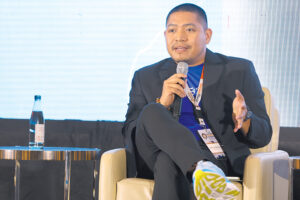By Mhicole A. Moral, Special Features and Content Writer
Despite growing global attention on artificial intelligence (AI), the Philippines continues to face significant challenges in adopting the technology on a wider scale. While some industries have shown early signs of progress, many businesses and individuals remain uncertain about how to begin using AI tools effectively.
Industry leaders addressed the issue during the BusinessWorld Economic Forum on May 22, where they discussed the current state of AI integration in the country. One of the speakers, Derick Ohmar Adil, senior director of AI Data Governance at Globe Telecom, shared his insights into how local organizations view AI and the barriers preventing broader adoption.
Mr. Adil said there is limited direction for businesses looking to implement AI. The primary issues include a lack of knowledge, guidance, and practical frameworks. Many companies remain unsure which AI tools are applicable to their operations or how to integrate the technology into existing processes.
“Most of the people we do business with are excited about AI, but they do not know where to start. Fifty-four percent are unsure how AI will be perceived or how they could use it to their advantage,” he noted. “It is difficult to begin, especially if they do not know where to start.”
Among the few major companies in the Philippines that adopted AI early, Globe Telecom has applied the technology in several areas, including network performance improvement, application development, and employee productivity tools. Mr. Adil noted that AI is also being used to personalize services for Globe’s customers.
“We started to use artificial intelligence to optimize our network, to improve our applications, and to be more productive,” he explained. “It is not just about making more revenue — it is about improving products and fixing service issues.”
However, this is not the case for most businesses in the Philippines, particularly small and medium-sized enterprises. Many remain on the sidelines due to the absence of clear policies, educational initiatives, and technical support.
Building trust through governance
Some countries have already implemented strong artificial intelligence governance models, but the Philippines has yet to establish clear governance frameworks.
Currently, efforts to regulate AI solely focus on safeguarding data privacy, preventing misuse, and ensuring compliance with national laws. Experts believe this is only the beginning, and that more structured and detailed governance frameworks are necessary.
Mr. Adil said good governance is not solely about creating policies. It should prioritize users and clients rather than align with the interests of specific institutions.
“Governance is about assessing the impact on people, on society,” he explained. “The challenge is constantly evaluating how these policies and AI systems affect the public and ensuring they meet people’s needs.”
The Globe executive emphasized that such policies come with responsibility and that governance cannot succeed without public trust.
“Trust is really a matter of course,” he explained. “Our customers choose brands they truly need — brands that share their values.”
In other words, building trust between technology providers and users will determine the success of AI governance in the Philippines. Industry players like Globe recognize that effective governance must balance the potential of technology with its possible risks to people.
“We need to embed security and privacy to properly respond to AI. It should be a core part of AI systems, not an afterthought,” he shared.
Mr. Adil also shared that users must be clearly informed about how AI systems use their data. Companies and organizations need to establish clear internal procedures to manage risks associated with AI.
Focusing on people and talent
Too many organizations are pursuing the latest artificial intelligence tools without fully understanding their relevance or effectiveness in specific areas, according to Mr. Adil.
“Not every problem needs AI. Not everything that looks like AI is actually AI,” he said. “We need to look at this in every context.”
The Globe executive shared the biggest challenge in AI adoption is not the technology itself but the people who shape how it is used and whether it brings real value. He emphasized that success in artificial intelligence relies heavily on training the right talent and enforcing strong governance, rather than simply spending large amounts of money on new tools or platforms.
“We need to invest in smarter, more grounded resources that can truly address real issues. It is not about spending more. We need to be more deliberate about where we invest,” Mr. Adil said.
He added that the real power of AI lies in its human element — those who build, manage and apply it. Without a trained and responsible workforce, the technology may fall short or even create new problems instead of solving existing ones.
“It is more about people and talent. We need to ensure we bring individuals into AI training who are passionate about it,” he explained. “There are many things you can do with AI, but those efforts must include strong training programs to develop skilled workers who can handle it responsibly.”
The future of AI, according to Mr. Adil, depends on how well the country can train and manage the human minds behind the machines. He believes governments, businesses and educational institutions must collaborate to create a strong foundation for AI success.
